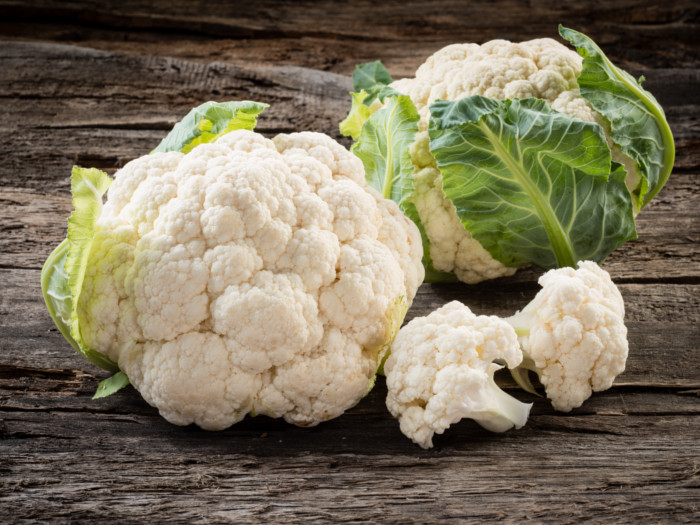Benefits of Eating Cauliflower
Contains Tons of Vitamins and Minerals
Cauliflower is a rich source of folate, B complex vitamins and vitamin E. It provides vital minerals such as calcium, magnesium, iron, phosphorous, potassium, sodium and zinc without adding any harmful cholesterol. It is a good source of protein, unsaturated fats, and essential omega-3 fatty acids. It also provides dietary fiber and contains smaller amounts of natural sugars as compared to the other members of its botanical relatives, such as broccoli.
Provides Protection and Nourishment By Boosting the Immune System
Cauliflower has power antioxidants, such as, Vitamin C and manganese that help provide protection and nourishment to the body. With immune-strengthening nutrients, and other healthy components, the presence of vitamin C, cauliflower in it inhibits various infections and strengthens the defense mechanisms of the body by hampering the growth of disease-causing inflammation. It also contains photochemical called glucosinates and insoles that stimulate cancer-blocking enzymes and alleviates oxidative stress and damage caused by free radicals.
Helps with Hypertension
Besides fighting free radicals, cauliflower has Vitamin K and glucoraphanin that ensures blood circulation and proper function of the blood vessels. Eating cauliflower also reduces the risk of atherosclerosis and promotes cardiovascular health. Also, vitamin K, may help in preventing bone loss in both men and women.
Great Source of Fiber, Controls Cholesterol
Cauliflower is a great source of dietary fiber. It aids in digestion and promotes the elimination of toxins from the body. The presence of glucoraphanin, glucosinolate, and sulforaphane in this vegetable protects the stomach lining and helps in resisting the growth of Heliobacter pylori bacteria. The antioxidant and anti-inflammatory properties of the glucoraphanin and sulforaphane present in cauliflower help with the levels of LDL (bad) cholesterol. It also promotes the stimulation of HDL (good) cholesterol and lowers blood pressure.
In addition, the fiber and omega-3 fatty acids present in cauliflower also prevent hardening of the arteries. Dietary isothiocyanates in cauliflower prevent the risk of various abdominal disorders such as stomach ulcers and colon cancer.
Helps Absorb Iron and Bone Density
Aids In Weight-Loss
Cauliflower possesses anti-obesity bacteria called indoles . Studies have found that consumption of cauliflower is beneficial in preventing various inflammatory and metabolic disorders in the body. It also helps in the stimulation of fat-burning thermogenesis, aids in weight loss and prevents obesity.
Aides In Growing Healthy Babies
Including cauliflower in your diet during pregnancy is beneficial because of the presence of essential folate, which helps in healthy neural development of the baby.
Helps Keep Efficient Nuerological Communication
Cauliflower contains minerals choline and phosphorous that are both effective in repairing cell membranes. This is essential for the efficient functioning of the brain and nervous system for transmitting nerve signals. In addition, the presence of potassium and vitamin B6 in cauliflower plays an important role in maintaining brain health and promoting proper communication in the nerves
Source: Organic Facts
Source: Organic Facts


No comments:
Post a Comment
Note: Only a member of this blog may post a comment.